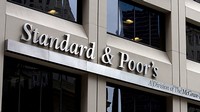U.S. Stocks Fall Erasing Earlier Advance
U.S. stock futures fell. This means the Standard & Poor's 500 Index may extend its biggest weekly drop since July, as an unexpected slump in orders for durable goods spurred concern the economy is struggling to recover.

General Electric Co., Intel.Corp. and Citigroup Inc. lost more than 1 percent after the Commerce Department reported a 2.4 percent slide in bookings for goods meant to last several years. Research In Motion Ltd., maker of the BlackBerry, tumbled 14 percent after its sales forecast trailed analysts' estimates.
"Two steps forward, one step back," said Michael Strauss, who helps oversee $25 billion at Commonfund in Wilton, Connecticut. "After a batch of good economic reports, investors got disappointed with durable goods orders numbers."
Futures on the Standard & Poor’s 500 Index expiring in December lost 0.2 percent to 1,041.8 at 8:58 a.m. in New York. Dow Jones Industrial Average futures retreated 19 points, or 0.2 percent, to 9,616. Nasdaq-100 futures slipped 0.2 percent to 1,696.75, Bloomberg reports.
In tyhe meantime, a Census Bureau report on durable goods showed orders slipped 2.4% in August after a 4.8% increase in July. Analysts surveyed by Briefing.com expect orders to have risen 0.4%. Excluding auto sales, goods orders showed a negligible decline. Economists forecast a 1% rise in goods orders excluding autos, compared to a 1.1% rise on that basis in the prior month. July's overall durable goods gain was mostly on Cash-for-Clunkers-backed auto sales.
The University of Michigan is set to issue a revised version of its consumer sentiment survey around 10 a.m. ET. Economists expect a slight rise in the index to 70.5, up from 70.2 in August.
New home sales for August also are due out at 10 a.m. ET. Experts anticipate sales of newly constructed homes to rise to a seasonally adjusted annual rate of 440,000, up from 433,000 in July.
The economic leaders of the G-20 nations will continue to meet in Pittsburgh on Friday for the second day of their economic summit. On Thursday, the leaders voted in favor of President Obama's plan to replace the G-8, which does not include developing economies such as China, India and Brazil, with the G-20 as the preeminent global economic decision-making body, CNNMoney.com reports.
It was also reported, restrained consumer spending and near-record excess capacity mean companies will probably not boost investment in new plants or equipment in coming months. The report indicates the jump in auto sales from the Obama administration’s $3 billion trade-in program may not give other industries a jolt, raising concern any factory rebound will be uneven.
"Firms are delaying spending where possible," said David Semmens, an economist at Standard Chartered Bank in New York. "The U.S. has a disappointing recovery ahead. We are not going to see the kind of rebound we are used to." U.S. stock-index futures fell after the report, erasing an earlier advance.
Economists forecast durable goods orders would increase 0.4 percent, according to the median of 75 projections in a Bloomberg News survey. Estimates ranged from a decline of 2 percent to a 4 percent gain. The government revised July data to show a 4.8 percent gain, down from a previously estimated 5.1 percent increase, Bloomberg reports.
Subscribe to Pravda.Ru Telegram channel, Facebook, RSS!





